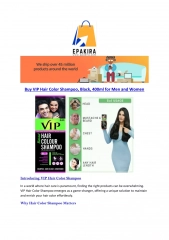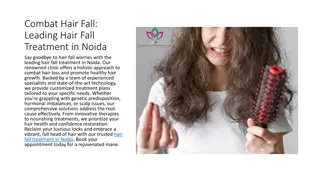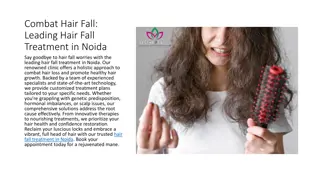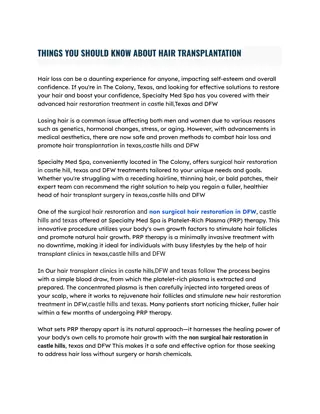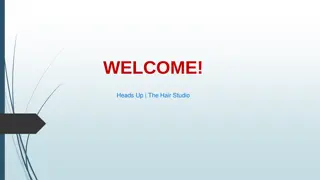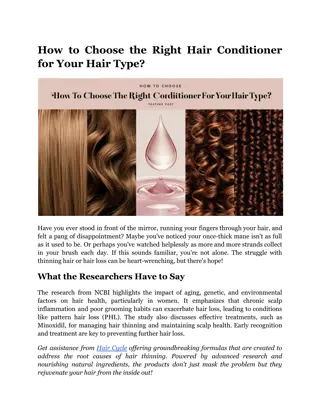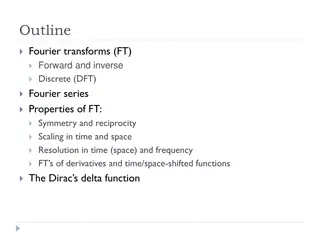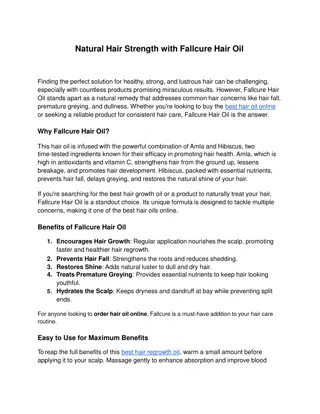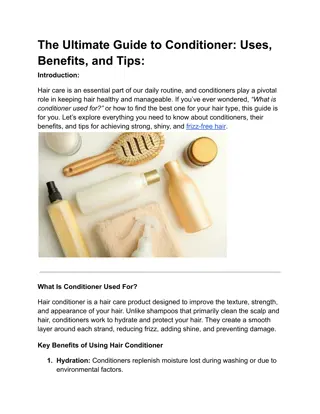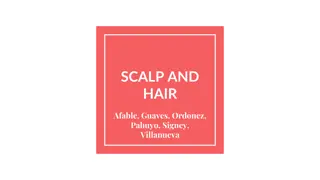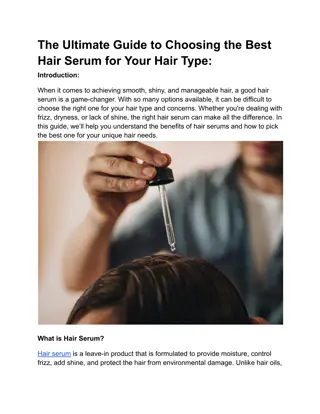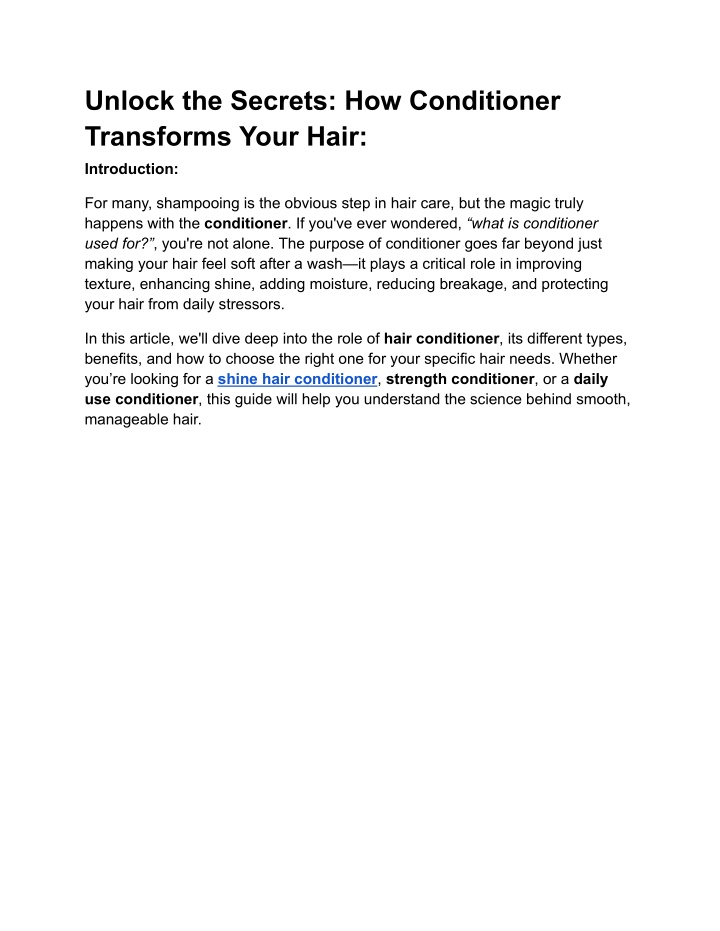
Unlock the Secrets How Conditioner Transforms Your Hair
For many, shampooing is the obvious step in hair care, but the magic truly happens with the conditioner. If you've ever wondered, u201cwhat is conditioner used for?u201d, you're not alone. The purpose of conditioner goes far beyond just making your
Download Presentation

Please find below an Image/Link to download the presentation.
The content on the website is provided AS IS for your information and personal use only. It may not be sold, licensed, or shared on other websites without obtaining consent from the author. If you encounter any issues during the download, it is possible that the publisher has removed the file from their server.
You are allowed to download the files provided on this website for personal or commercial use, subject to the condition that they are used lawfully. All files are the property of their respective owners.
The content on the website is provided AS IS for your information and personal use only. It may not be sold, licensed, or shared on other websites without obtaining consent from the author.
E N D
Presentation Transcript
Unlock the Secrets: How Conditioner Transforms Your Hair: Introduction: For many, shampooing is the obvious step in hair care, but the magic truly happens with the conditioner. If you've ever wondered, what is conditioner used for? , you're not alone. The purpose of conditioner goes far beyond just making your hair feel soft after a wash it plays a critical role in improving texture, enhancing shine, adding moisture, reducing breakage, and protecting your hair from daily stressors. In this article, we'll dive deep into the role of hair conditioner, its different types, benefits, and how to choose the right one for your specific hair needs. Whether you re looking for a shine hair conditioner, strength conditioner, or a daily use conditioner, this guide will help you understand the science behind smooth, manageable hair.
What Is Conditioner Used For? Simply put, conditioner is a hair care product designed to moisturize and nourish the hair shaft. It helps replenish natural oils stripped away by shampoo and restores hydration. The most common answer to what is hair conditioner used for includes: Restoring Moisture: Rehydrates dry hair, especially after using clarifying or harsh shampoos. Smoothing the Cuticle: Helps seal hair cuticles, reducing frizz and flyaways. Improving Texture: Makes hair soft, smooth, and manageable. Enhancing Shine: Adds a natural gloss or shine to your strands. Detangling: Reduces knots and tangles, making hair easier to comb. Protecting Hair: Shields hair from environmental damage and styling tools. So the next time someone asks, what is conditioner used for? , remember it s not just about softness, it's about protection and repair Different Types of Hair Conditioners and Their Benefits Hair needs vary based on texture, health, and lifestyle. Luckily, conditioners are formulated to cater to different needs. 1. Daily Use Conditioner Ideal for people who wash their hair frequently, a daily use conditioner is lightweight and hydrates without weighing hair down. It helps maintain shine and smoothness while offering basic protection. 2. Strength Conditioner A strength conditioner is enriched with proteins and amino acids to fortify weak or damaged hair. This is essential for people who dye, bleach, or heat-style their hair often. The best strength conditioners work by penetrating the hair shaft and rebuilding broken bonds. 3. Shine Hair Conditioner
If dullness is your primary concern, go for a shine hair conditioner. It adds vibrancy to your locks by smoothing the cuticle and reflecting more light. A high-quality conditioner for shine leaves your hair glowing and silky. 4. Lactic Acid Hair Conditioner One of the newer stars in hair care is the lactic acid hair conditioner. Lactic acid gently exfoliates the scalp, balances pH levels, and hydrates the hair. It s excellent for promoting scalp health and improving hair elasticity without being too harsh. How to Properly Use Hair Conditioner Knowing how to apply hair conditioner properly is crucial to get the best results: 1. Shampoo First: Clean your scalp and hair with a suitable shampoo. 2. Apply Conditioner: Focus on mid-lengths and ends these areas are more prone to damage. Avoid applying directly to the scalp unless the product is made for that. 3. Leave It In: Let the conditioner sit for 2 5 minutes (or as recommended on the label) to allow absorption. 4. Rinse Thoroughly: Use cool or lukewarm water to rinse, which helps seal the cuticle. Using a conditioner after every shampoo can drastically improve your hair health over time. Common Myths About Hair Conditioner Let s debunk some common misconceptions aboutconditioner for hair: Myth: Conditioner causes hair fall. Truth: When applied correctly to the ends and not the scalp, conditioner does not cause hair fall. In fact, it can reduce breakage due to detangling. Myth: Oily hair doesn't need conditioner. Truth: Even oily hair needs moisture use a lightweight or daily use conditioner that won t weigh your hair down. Myth: All conditioners are the same. Truth: From lactic acid hair conditioners to protein-rich strength
conditioners, each serves a unique purpose. Choose one based on your specific hair concern. How Conditioner Helps Maintain a Healthy Scalp and Hair While most people associate conditioners only with the ends of hair, certain formulations can benefit the scalp too. For example, a lactic acid hair conditioner can mildly exfoliate and maintain scalp pH, preventing dandruff and buildup. Conditioning your hair regularly helps: Reduce breakage Prevent split ends Enhance elasticity Increase shine Reduce static and frizz All these benefits contribute to stronger, healthier, and better-looking hair. Choosing the Right Conditioner for Your Hair Type To get the most out of your conditioner, select one based on your hair s condition: Dry/Damaged Hair: Look for protein-enriched or strength conditioners with oils and butters. Oily Hair: Use a lightweight daily use conditioner that hydrates without heaviness. Curly Hair: Opt for ultra-hydrating formulas to define curls and prevent frizz. Color-Treated Hair: Use sulfate-free conditioners with UV protection to prevent color fading. Make sure to read labels carefully. Some spellings like conditinor or condioner are simply common typos but always ensure product authenticity and formulation. Additional Tips to Maximize Conditioner Benefits Use a wide-tooth comb in the shower to distribute the product evenly. Don't apply conditioner on the scalp unless directed this can lead to buildup.
For extra nourishment, try a deep conditioning treatment once a week Seal in moisture with a leave-in conditioner or serum after towel drying. Final Thoughts: Conditioner is a Haircare Essential So, what is hair conditioner used for? Beyond softening your strands, conditioner is a vital part of any hair care routine that strengthens, hydrates, and protects. From shine hair conditioners to strength conditioners, there s a perfect product out there for every hair type and concern. Including a quality hair conditioner in your regular routine ensures that your hair not only looks healthy but truly is healthy from the inside out. Brought to You by AccuFix Cosmetics At AccuFix Cosmetics, we understand that every strand matters. Our range of conditioners from lactic acid hair conditioners to daily use conditioners is designed with scientifically backed ingredients to help you achieve the healthiest version of your hair. Whether you seek shine, strength, or everyday nourishment, AccuFix delivers high-performance hair care you can trust. Choose AccuFix Cosmetics where beauty meets science, and every wash transforms your hair.

